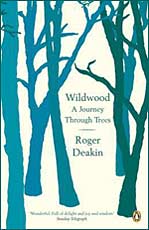Roger Deakin, a popular British nature writer and environmentalist, died in August of 2006 shortly after completing the manuscript of Wildwood: A Journey Through Trees. In the introduction, the author notes:
"The Chinese count wood as the fifth element, and Jung considered trees as an archetype. Nothing can compete with these larger-than-life organisms for signaling the changes in the natural world. They are our barometers of the weather and the changing seasons. We tell the time of year by them. Trees have the capacity to rise to the heavens and to connect us to the sky, to endure, to renew, to bear fruit, and to burn and warm us through the winter. I know of nothing quite as elemental as the log fire glowing in my hearth, nothing that excites the imagination and the passions quite as much as its flames."
Obviously, Roger Deakin loves trees, and he shares his enthusiasm and reverence for them on these pages. He illustrates that nature provides a theater for some of our most dramatic experiences of the sacred. With great élan, Deakin salutes trees and the roles they play in the world, in our souls, in our culture, and in our lives. He writes about the delight of sleeping outdoors and hearing "the yawn of the wind in trees," the timber in his Elizabethan house, walking in the woods during winter and seeing "a white line of snow penciled up the north-east side of each tree," the sea rounded corners of driftwood, the ways a pencil "whispers across the page and is never dogmatic," the reverence given to birches in Japan and Finland, the habits of half-rotten, dying trees to cling to life by sending up new shoots, the challenges faced by the roots of trees as they feel their way towards underground water, the battle of elms against disease, and trees' propensity to grow toward the light. Wildwood fulfills Deakin's personal mission, which he once expressed as:
"A writer needs a strong passion to change things, not just to reflect or report them as they are. Mine is to promote a feeling for the importance of trees through a greater understanding of them, so that people don't just think of 'trees' as they mostly do now, but of each individual tree, and of each kind of tree."
